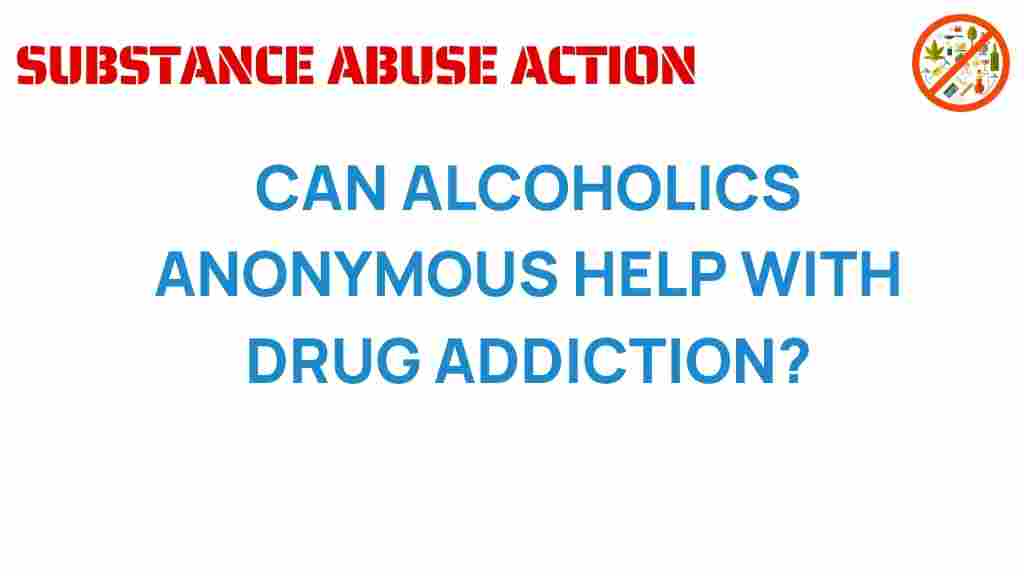Can Alcoholics Anonymous Be the Key to Overcoming Drug Addiction?
When it comes to battling drug addiction, finding the right support system can make all the difference. Alcoholics Anonymous (AA) is widely known for its role in helping individuals recover from alcohol dependency, but many people wonder whether its principles can also be effective in addressing drug addiction. This article explores how Alcoholics Anonymous can provide essential support in the journey toward recovery from drug addiction, highlighting the importance of community, peer support, and a structured approach to treatment.
Understanding Alcoholics Anonymous
Alcoholics Anonymous is a global fellowship founded in 1935 that offers a supportive environment for individuals seeking to overcome alcohol addiction. The program is based on a 12-step approach, which emphasizes personal responsibility, accountability, and the importance of community support. While AA primarily focuses on alcohol, the principles and practices of the program have been successfully adapted to assist individuals struggling with various forms of drug addiction.
Why Alcoholics Anonymous Works for Drug Addiction Recovery
The effectiveness of Alcoholics Anonymous in helping individuals with drug addiction can be attributed to several key factors:
- Peer Support: AA provides a platform for individuals to connect with others who have faced similar challenges. This peer support is crucial in fostering a sense of belonging and understanding.
- Structured Approach: The 12-step program offers a clear framework for recovery, guiding participants through the process of acknowledging their addiction and taking actionable steps toward sobriety.
- Community Focus: The communal aspect of AA helps members feel less isolated, as they share their stories, struggles, and successes with like-minded individuals.
- Accountability: Regular meetings and the sponsor system encourage members to stay committed to their recovery goals.
How to Get Started with Alcoholics Anonymous
If you or a loved one is considering Alcoholics Anonymous as a pathway to overcoming drug addiction, here’s a step-by-step process to get started:
Step 1: Acknowledge the Problem
The first step in recovery is recognizing that there is a problem with substance use. This often involves a personal reflection and an honest assessment of how drug addiction has affected various aspects of life.
Step 2: Find a Local AA Group
Search for Alcoholics Anonymous meetings in your area. You can often find these meetings through local community centers, hospitals, or the official AA website. Many groups also offer online meetings, making it more accessible for those who may have transportation or mobility issues.
Step 3: Attend a Meeting
Your first meeting may feel intimidating, but remember that everyone there shares a common goal of recovery. Meetings typically begin with introductions and may include sharing personal stories, discussing the 12 steps, or listening to guest speakers.
Step 4: Find a Sponsor
A sponsor is someone who has experienced similar struggles and can provide guidance and support. They will help you navigate the challenges of recovery and hold you accountable for your progress.
Step 5: Engage in the Community
Participate actively in the AA community. Attend meetings regularly, share your experiences, and support others in their recovery journey. Building relationships within the group can significantly enhance your recovery experience.
Challenges You Might Face in Recovery
Challenge 1: Feeling Out of Place
It’s not uncommon to feel uncomfortable during your first few meetings. Remember that everyone is there to support one another, and you are not alone in your feelings. With time, you will likely find your comfort zone within the group.
Challenge 2: Relapse
Relapses can happen. If you find yourself slipping back into old habits, reach out to your sponsor or fellow members immediately. Having a solid support system can help you regain focus and motivation.
Challenge 3: Stigma and Judgment
Concerns about stigma can prevent individuals from seeking help. Understand that AA is a confidential space where members support one another without judgment. Sharing your story can be a powerful way to help others and yourself.
Challenge 4: Lack of Immediate Results
Recovery is a journey that takes time. Set realistic goals and celebrate small victories along the way. The process can be slow, but persistence is key.
Additional Resources for Recovery
In addition to Alcoholics Anonymous, there are many resources available for those seeking addiction help:
- Substance Abuse and Mental Health Services Administration (SAMHSA): Provides a wealth of information on treatment options and support services.
- Therapy and Counseling: Individual or group therapy can complement your AA experience and provide additional coping strategies.
- Rehabilitation Programs: Intensive outpatient or residential rehabilitation programs can offer structured treatment for drug addiction.
The Importance of Community in Recovery
The community aspect of Alcoholics Anonymous cannot be overstated. Building relationships with others who understand your struggles can significantly enhance your chances of success. Here are some benefits of being part of a recovery community:
- Shared Experiences: Hearing others’ stories can provide perspective and inspiration for your own journey.
- Emotional Support: A supportive community can help you navigate the emotional highs and lows of recovery.
- Accountability: Regular interactions with peers can keep you accountable for your recovery goals.
- Resource Sharing: Members often share helpful resources, tips, and strategies for staying sober.
Conclusion
In conclusion, Alcoholics Anonymous can indeed be a key component in overcoming drug addiction. By offering a structured support system, emphasizing accountability, and fostering a sense of community, AA provides resources and encouragement for individuals seeking recovery. While it may not be the only solution, it can be a powerful tool when combined with other forms of treatment and support. If you or someone you know is struggling with drug addiction, consider exploring Alcoholics Anonymous as part of a comprehensive recovery plan.
Remember, recovery is a personal journey, and finding the right combination of support and treatment is essential. With determination, the right resources, and a supportive community, overcoming drug addiction is possible.
This article is in the category Recovery and created by SubstanceAbuseAction Team
